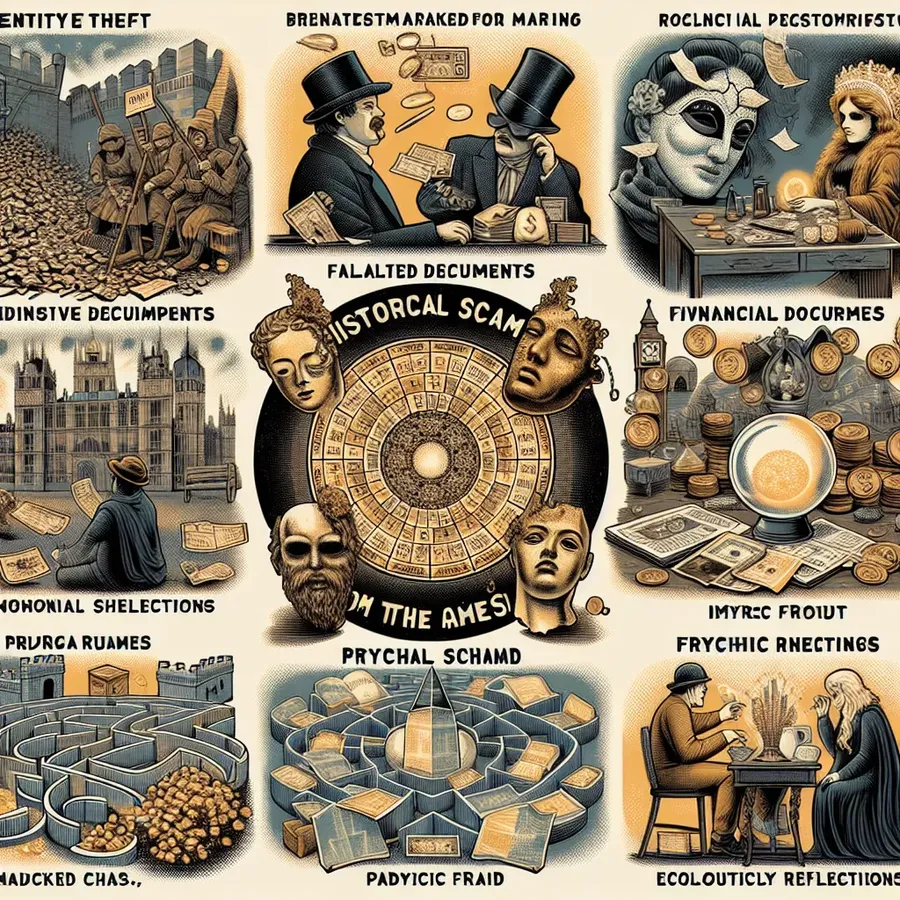Unmasking the Biggest Scams in History
Explore the biggest scams in history and learn valuable lessons from notorious frauds that shaped society.

The history of human civilization is peppered with audacious scams, each more outlandish than the last. While today we rely on Forest VPN to protect ourselves from digital fraud, history shows that deception has always been a part of human ingenuity. From fake heir apparents to elaborate financial schemes, these scams have reshaped societies and economies, teaching us valuable lessons in vigilance and skepticism. Let’s delve into some of the most notorious scams in history and explore how they impacted the world.
The Pretender: Perkin Warbeck
Long before today’s digital age, identity theft was already making waves. Perkin Warbeck was a 15th-century figure whose life reads like a tale out of a historical drama. Claiming to be Richard, Duke of York, Warbeck gathered an army and nearly toppled the English monarchy. His deception was so convincing that he managed to rally support from European royalty. This historical scam reminds us that even in a world without the internet, trust was a precious commodity easily exploited.
Lessons Learned
- Trust with Caution: Just as Warbeck’s peers were duped, modern-day users must be wary of deceptive online personas.
- Verification: Always verify the authenticity of claims, whether in medieval courts or online platforms.
Fraudster | Era | Impact |
|---|---|---|
Perkin Warbeck | 15th C. | Nearly overthrew the English monarchy |
Charles Ponzi | 1920s | Inspired the term “Ponzi scheme” |
Maria Duval | 20th C. | Scammed millions with fake psychic predictions |
The Original Ponzi Scheme
Charles Ponzi gave his name to one of the most infamous financial scams of all time. In the 1920s, Ponzi promised investors extraordinary returns by exploiting international postal reply coupons. However, he was merely using new investors’ money to pay off earlier ones. The scheme grew until it inevitably collapsed, costing many their life savings.
Modern Implications
- Investment Caution: Just as Ponzi’s victims were misled by greed, today’s investors must scrutinize too-good-to-be-true offers.
- Financial Literacy: Educating oneself on investment principles is crucial to avoiding similar traps.
Maria Duval and the Psychic Heist
In a bizarre twist of modern fraud, Maria Duval orchestrated a con that spanned the globe, preying on the vulnerable with promises of psychic revelations. Victims, often elderly, were coaxed into sending money for worthless charms and predictions. This scam underscores the emotional manipulation at play, often targeting those seeking hope or companionship.
Protecting the Vulnerable
- Awareness Programs: Educating potential targets about common scams can prevent exploitation.
- Support Networks: Family and community support can act as a safeguard against isolation and subsequent victimization.
The Barings Bank Collapse
Nick Leeson, a rogue trader, single-handedly brought down Barings Bank in 1995 through unauthorized trades and deceit. His actions went unnoticed due to inadequate oversight, resulting in the bank’s catastrophic collapse. This case highlights the importance of stringent financial regulations and internal controls.
Financial Oversight
- Robust Auditing: Implementing rigorous audit processes can prevent similar financial disasters.
- Regulatory Measures: Continuous evaluation and adaptation of financial regulations are necessary to catch potential fraud early.
Tips for Staying Safe in a World of Scams
Even though these historical scams seem distant, the principles of deception remain the same. Here are some tips to protect yourself:
- Use Secure Networks: Tools like Forest VPN can safeguard your online activities from prying eyes and potential fraudsters.
- Stay Informed: Regularly update yourself on common scam tactics to recognize red flags.
- Verify Sources: Whether it’s a financial opportunity or a personal connection, always verify the authenticity of the source.
In a world where scams evolve with technology, we must remain vigilant and informed. History teaches us that while the methods may change, the essence of deception remains the same. By learning from the past, we can better equip ourselves to face the future’s challenges.
Biggest Scams in History
Throughout history, various scams have left a significant impact, including:
- Ponzi Scheme (Charles Ponzi): Promised high returns, exploiting new investors.
- Enron Scandal: Overstated profits, leading to bankruptcy.
- Bernie Madoff: Operated the largest Ponzi scheme in history, defrauding thousands.
Protect Yourself
With the rise of online scams, securing your data is crucial. Using Forest VPN can help protect your online presence, ensuring your personal information remains private and secure.
Stay informed and safeguard against fraud! Discover more about the benefits of using Forest VPN here.
FAQs about Historical Fraud and Its Impact
What was the significance of Perkin Warbeck’s actions in the 15th century?
Perkin Warbeck’s audacious claim to be Richard, Duke of York, highlighted the dangers of identity theft, influencing political dynamics and demonstrating how trust can be exploited for personal gain.
How did Charles Ponzi’s scheme influence modern investment practices?
Charles Ponzi’s fraudulent investment scheme introduced the term ‘Ponzi scheme’ and serves as a cautionary tale for investors today, emphasizing the importance of due diligence and skepticism towards high-return promises.
What can we learn from Maria Duval’s psychic fraud case?
Maria Duval’s case illustrates the emotional manipulation used in scams, particularly targeting vulnerable populations. It underscores the need for awareness programs to protect individuals from exploitation.
Why is the Barings Bank collapse a critical example of financial oversight failure?
The Barings Bank collapse, caused by rogue trader Nick Leeson’s unauthorized trades, exemplifies the necessity for robust internal controls and regulatory measures to prevent financial fraud and protect institutions.
What are some effective ways to protect oneself from modern fraud schemes?
Utilizing secure networks like Forest VPN, staying informed about common scams, and verifying sources are essential steps individuals can take to safeguard against fraud in today’s digital landscape.
